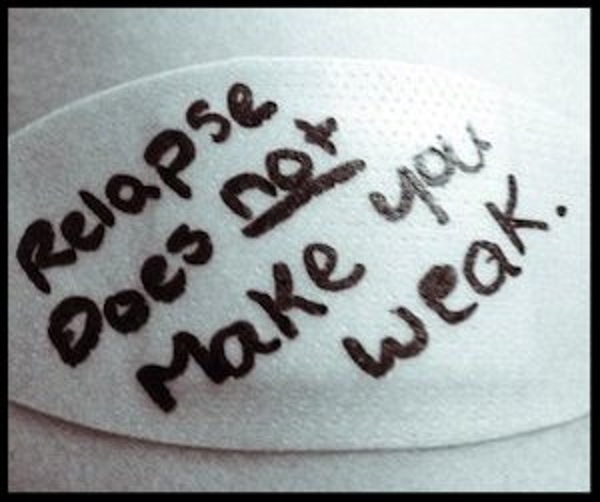
What is the relapse prevention? Is it possible? Some studies put the relapse rate for substance abuse at 40-60% Some studies are much higher.
What's the right way to think about relapse prevention?
Relapse Definition
Relapse is a verb (used without object)
According to Dictionary.com, relapse is defined as follows:
- to fall or slip back into a former state, practice, etc.
- to fall back into illness after convalescence or apparent recovery.
- to fall back into vice, wrongdoing, or error; backslide:
For those recovering from addiction, "relapse" has been a shameful event for years and years.
Friends and family would scorn the fallen addict, self help organizations would make the person throw away their “clean time” and get a beginner's chip while having to attend 90 AA meetings in 90 days
Relapse during recovery meant jobs would be lost and relationships would end, among other hardships.
Instead of facing all this humiliation, many in addiction recovery would return to the preferred substance, as this seemed like a better option.
We want to say here and now that there is better alternative.
The Secret to Relapse Prevention
The biggest mistake you can make when it comes to relapse prevention is not planning for a relapse.
Slip vs. Relapse During Addiction Recovery
In our program we don't actually use the term relapse. Instead, we use the term "slip". The reason is because we think of relapse (the choice to use again) as a slip back into a limiting behavior.
It might also be that you get really angry and you yell, and you let your anger take over. It could also be that you binge eat, or that you don’t keep a promise to yourself to exercise, or to do meditation, or to do another self-care practice. So a slip can look a lot of different ways.
We just characterize it as it’s a limiting behavior that you slide back into.
Making a plan for a slip is not the same as saying that, “This is what I intend.”
It’s actually the opposite.
It’s saying that, “I realize that this is a challenge for me, and I’m going to be really proactive about making a plan to get back on my feet if I do experience a slip.”
By turning away from it and saying, “That could never happen,” and pushing it away, what we resist actually persists. The more we resist that possibility that we might face a slip, the more ill-prepared we are to actually experience one and get back on our feet after it.
It’s a bit counterintuitive, but we’ve worked with a lot of graduates, and our success rate is over 80%, which is unheard of in the addiction treatment industry.
Behavioral Change is a Spiral, Not a Straight Line
In our culture, we tend to think of change as very linear, as a straight line. "I started here at point A, and I'm going to get to point B. If I have a slip, then I've fallen off the line, I have ruined my progress, everything is over." We have this very all-or-nothing way of thinking about it.
But what may be helpful for you is to think about the idea of behavioral change as a spiral, rather than a straight line.
In a spiral, we may return to the same issues again and again, but each time we meet those same issues, we meet them on a different level, or on a different place on that spiral, like a spring going upward.

As an example, in my own life, when I was fortunate to go through The Clearing's addiction recovery program, I didn't have a drug or an alcohol issue, but I really struggled with overwork, perfectionism, just constant need to control.
That's something that I've returned to. It's a theme in my life. But every time I return, I face the issue at a different level. The tools and all the things that I've learned through The Clearing, through counseling, through everything else, equipped me to handle those issues differently.
So it's not about pushing the issue away and saying, "I'm never going to deal with this again." It's about equipping yourself and preparing yourself to experience that change spiral.
The Issue Isn’t The Issue
Every day, we are given opportunities for growth and learning.
This especially applies to relapse.
We like to say, "how you are with yourself as you face your issue is the issue."
The issue isn't whether you slip, or whether you relapse, or whether you go back to that limiting behavior again. The real issue is how you are with yourself as you go through the issue.
The real issue is how you are with yourself as you go through the issue.
So to use binge eating as an example, the issue is not whether you never binge eat again. The issue is how do you treat yourself if you binge eat again.
What's your relationship like with yourself?
Because if you can learn to be with yourself in a loving way, before, during, and even after a slip, that's going to take you all the way home. That relationship with yourself is the thing that matters.
Slips are Learning Opportunities
We don’t view slips as being bad or wrong, but opportunities for further growth and development.
It’s an invitation to take a deeper cut. In this way we don’t need to be guilted or shamed or go back to square one, but we do need to push on from where we left off.
It's an invitation to approach that same thing from another point on the change spiral. Use it as an opportunity to use yur tools and what you've learned in order to grow.
What to Do When You Relapse
Once you've had a slip, once you've yelled at somebody, once you've taken that drink, whatever it is that you didn't want to do, once it's happened, it's happened.
It's in the past.
It's already over.
And the truth is that you can't feel bad enough to change it. You can't feel bad enough to change the past. All the self-pity, all the self-blame, the recrimination, all of that, that is not powerful enough to take you back in time and change what happened.
You're spending your precious energy on something that cannot be changed fundamentally.
You can't feel bad enough to change the past.
It is freeing to realize, "It's already in the past. I already get to start over. I'm already in a new moment."
As soon as it's over, it's over. You're in a new moment right here and right now. What are you going to do going forward? That's the more interesting and powerful question.
Making the Relapse Prevention Plan
When it comes to making a plan for slip prevention or relapse prevention, what you want to do is really look at, "What were my thoughts and my feelings prior to when I was tempted to slip or when I did slip? What was going on for me? What came up for me?"
You don't just want to look at it and say, "Oh, that was random. Weird. That happened."
You want to dig deeper.
You want to be a detective of your own experience and really look at the thoughts and the feelings that were alive and were happening within you.
Once you've done that, you can use the tools that we've shared in other videos here. You can use co-creation and ideal scenes, you can use healing your underlying core issues, forgiving your judgments, identifying your limiting beliefs, following the energy back, re-parenting your inner child—all of these phenomenal techniques that we teach in our program and that we've shared in prior videos as well.
The beginning of recovery is not to pretend there's not a tiger in the room with you, to use the popular analogy, but to recognize, "Oh, look. That's a tiger. That's really powerful. I best have a plan to deal with what will happen when that tiger comes closer to me."

About The Clearing
The Clearing is a residential rehab located on beautiful San Juan Island, Washington. We created The Clearing in response to the pervasiveness of treatment centers that focus more on luxury than modern, evidence-based therapy.
Our approach is based on healing the underlying core issues that cause addiction. If you'd like to learn more, contact us, or download our free eBook:
Heal Underlying Core Issues EBook Free Download



